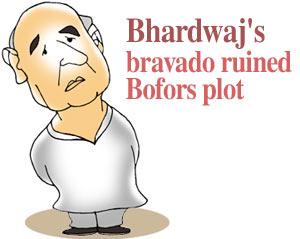|
|
| Help | |
| You are here: Rediff Home » India » News » Columnists » Capital Buzz |
|
| |||||||||||||||||||||||
|
| |||||||||||||||||||||||
The prime minister was completely taken by surprise when the newly-launched television news channel CNN-IBN broke the story about the government wanting to defreeze Ottavio Quattrochhi's bank accounts. Only after serious implications of the disclosure had sunk in did the prime minister's aides make frantic efforts to gather information from the dramatic personae involved. When a prime ministerial aide remonstrated with Union Law Minister Hansraj Bhardwaj for the embarrassment his action had caused Dr Manmohan Singh [Images], the latter thought he would do the prime minister a favour by publicly owning up sole responsibility for having dispatched Additional Solicitor General B Dutta to London [Images] to free the accounts. Soon, Bhardwaj was making a statement before television cameras that he alone had authorised Dutta's London mission, a confession he would later regret as a change of plot called for the Central Bureau of Investigation to take the rap. Bhardwaj could not have done what he did without perhaps a signal from 10 Janpath (where Congress president Sonia Gandhi [Images] lives). As he himself proclaims from the rooftops, he draws his power directly from 10 Janpath and 'even though there are many in my party who want my job, so long as I have her on my side, nobody can remove me.' That Bhardwaj is an old Gandhi-Nehru loyalist ought to be clear from his public confession that he was made law minister in the P V Narasimha Rao government at her request. Who approved the London Bofors mission? In other words, did Dutta go to London without securing a go-ahead from the screening committee or expenditure secretary's approval? Or did the latter endorse the visit even though its objective was unwholesome? Incidentally, the expenditure secretary in question, Adarsh Kishore, has since been promoted as finance secretary. Thanks, but no thanks The Atal Bihari Vajpayee government bestowed Padma awards on journalists as if they were Diwali sweets to be handed out to all comers. Controversial journalists wangled favours simply by humouring an extra-constitutional centre of power in the Vajpayee household. Mercifully, the Manmohan Singh government is not half as frivolous in these matters. It is to Dr Singh's credit that he personally recommended two distinguished media personalities this Republic Day. Both -- T N Ninan, editor-in-chief, Business Standard and Prannoy Roy, founder-editor, NDTV -- were selected by the awards committee. However, as per the established drill, before sending up the names, the two were sounded by a senior official. Both men politely, but firmly, declined. Paise coins are dead Will someone please tell Bharti Tele Ventures Ltd -- who run the country's largest cellular phone network under the Airtel banner -- that even if the RBI governor tried to produce a paise coin, he would find it impossible to do so? Despite requests by users over the years, Airtel continues to bill subscribers in small fractions of a rupee. A recent bill received by a senior New Delhi scribe read 'Rs 1,945.47 paise.' Airtel's rival Hutch has, since inception, billed customers to the nearest rupee, forgoing all paise if under half a rupee and billing a full rupee if the sum involved is 51 paise or more. But Airtel expects you to pay 47 paise, 13 paise, 89 paise, etc. Should you pay in cash and insist on the requisite change being returned, it is certain the company would find it hard to keep to the letter of the law in the matter. It would help if the RBI were to issue a general circular to end this strange situation.
 More on the latest Bofors fiasco for the prime minister to chew on. As per the laid down drill, foreign travel by everyone in government needs to be cleared in advance by the screening committee of secretaries. In particular, the expenditure secretary's approval is required. Therefore, Additional Solicitor General Dutta could not have gone to London without prior approval.
More on the latest Bofors fiasco for the prime minister to chew on. As per the laid down drill, foreign travel by everyone in government needs to be cleared in advance by the screening committee of secretaries. In particular, the expenditure secretary's approval is required. Therefore, Additional Solicitor General Dutta could not have gone to London without prior approval.
Nothing new in phone tapping
 With regard to the telephone tapping controversy, it can now be revealed that, in the NDA regime, people close to then prime minister Vajpayee genuinely believed that someone very high up in government was eavesdropping on them.
With regard to the telephone tapping controversy, it can now be revealed that, in the NDA regime, people close to then prime minister Vajpayee genuinely believed that someone very high up in government was eavesdropping on them.
Whether true or not, Vajpayee's foster family thought that phones at the Race Course Road complex were being tapped.
A socialist hangover, this?
 Without professional management practices, globalisation and the opening up of the economy can hardly breathe life into the dying public sector.
Without professional management practices, globalisation and the opening up of the economy can hardly breathe life into the dying public sector.
Take the case of national carrier Air-India.
A recent flight from New Delhi to New York via London had just one paying passenger in first class, though all other seats were duly taken by those who had been 'upgraded' from business class.
Barring the lone passenger, the cabin was vacant as the usual suspects who get upgraded had disembarked in London. Incidentally, the lone fare-paying passenger too was a senior babu who was duly entitled to travel in first class.
Illustrations: Uttam Ghosh
Capital Buzz
|
|
| © 2007 Rediff.com India Limited. All Rights Reserved. Disclaimer | Feedback |